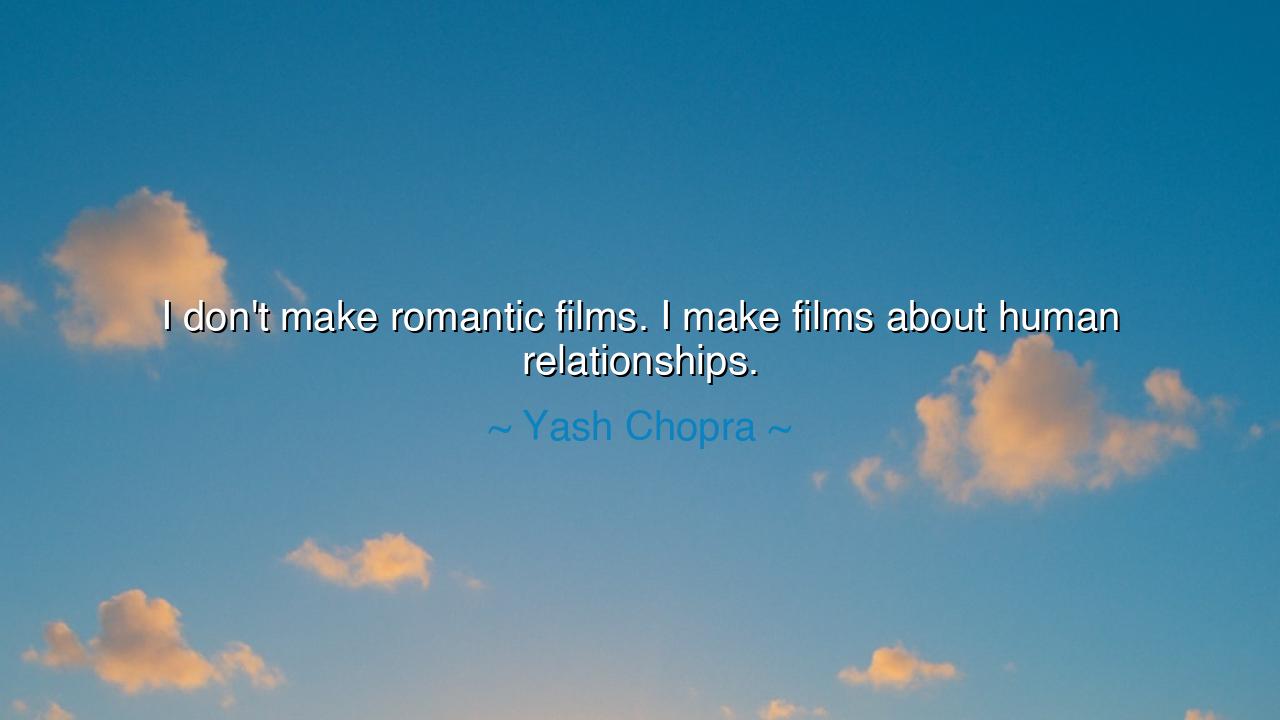
I don't make romantic films. I make films about human






Hear, O children of the earth, the words of the great Yash Chopra, a master of cinema and a chronicler of the human soul. He said, “I don’t make romantic films. I make films about human relationships.” In these words lies a profound understanding of the true nature of storytelling, of art, and of life itself. Chopra, a creator whose films have touched the hearts of millions, did not seek to craft mere tales of love, fleeting and temporary as they may be. Instead, he sought to explore the essence of human connection, to delve into the complexity of relationships in all their forms—be they of love, friendship, family, or even rivalry.
At the heart of Chopra’s vision lies a truth that transcends the boundaries of film. Romantic love, though a powerful force, is but one thread in the tapestry of human experience. We are not defined by any one relationship, but by the multitudes of connections we form with others over the course of our lives. These relationships, fraught with joy, pain, sacrifice, and understanding, form the foundation of who we are. Chopra understood this well. His films, such as Dilwale Dulhania Le Jayenge and Kabhi Kabhie, did not merely revolve around the romantic union between lovers. They spoke of family ties, friendships, and the struggles that come with being connected to another soul. The true beauty of these films lay not just in the love between individuals, but in the relationships they navigated, the decisions they made, and the personal growth they experienced.
Consider, if you will, the ancient tale of Achilles and Patroclus, two warriors whose bond was more than that of comrades-in-arms. Their friendship transcended the battlefield, for it was one of deep emotional connection, where each fought not for glory alone, but for the very soul of the other. The bond between them was not defined by romantic love alone, but by the strength of their human relationship—their loyalty, their sacrifices, their understanding of one another's deepest fears and desires. And when Patroclus fell in battle, it was the relationship between the two that drove Achilles to avenge him, to face his own fate with a heart broken by the loss of a friend. In their bond, we see the foundation of true human connection: it is not merely love, but understanding, sacrifice, and loyalty that binds us together.
Yash Chopra, like the storytellers of old, did not view romance as an isolated theme. He understood that love, in its truest form, is not merely about affection or attraction, but about the interplay between the individuals involved. Relationships, whether familial or romantic, are not simple and linear. They are complex, filled with tensions and conflict, but also with the power to heal and transform. Take the example of King Lear from Shakespeare’s great tragedy. His relationships with his daughters, though filled with love, are also marked by betrayal, misunderstanding, and the consequences of rash decisions. The tragedy of Lear is not merely his romantic fate, but the unraveling of the relationships that define his very existence. True storytelling, as Chopra understood, is about examining these complexities, seeing how they shape the soul of the individual and the course of the world.
This wisdom extends beyond the realm of cinema and into the very fabric of our own lives. Human relationships are the crucible in which we are tested, shaped, and transformed. Whether in the bonds of family, the ties of friendship, or the connection of love, it is through these relationships that we learn the deepest truths about ourselves and the world. Each relationship, be it joyful or painful, teaches us something essential about compassion, forgiveness, and the fragility of the human condition. Much like the characters in Chopra’s films, we too must navigate the complex terrain of human connection, struggling to understand, to empathize, and to grow.
The lesson here is not just one of storytelling, but of living. Just as Chopra sought to elevate human relationships in his films, we must seek to understand and nurture the relationships in our own lives. Do not reduce the people around you to mere roles—husband, wife, friend, colleague. They are not defined by the surface-level aspects of their existence. Look deeper, and you will see the intricate web of emotions, dreams, fears, and aspirations that make them who they are. Just as Chopra portrayed the complexity of human relationships in his art, so must we seek to live with the understanding that every connection we form is an opportunity for growth, for learning, and for deepening our humanity.
Thus, my children, I say unto you: Do not confine your understanding of love and relationships to the simple narratives of romance. Look deeper, and seek to understand the full spectrum of human connection. Be it in joy or sorrow, in family or friendship, each relationship is an opportunity to learn, to grow, and to become. Understand the complexity of the bonds that shape your life, and you will find that they are not just the threads of individual stories, but the very fabric that holds the world together. In every relationship, there is a lesson to be learned, a truth to be discovered, and a path to greater understanding.






AAdministratorAdministrator
Welcome, honored guests. Please leave a comment, we will respond soon